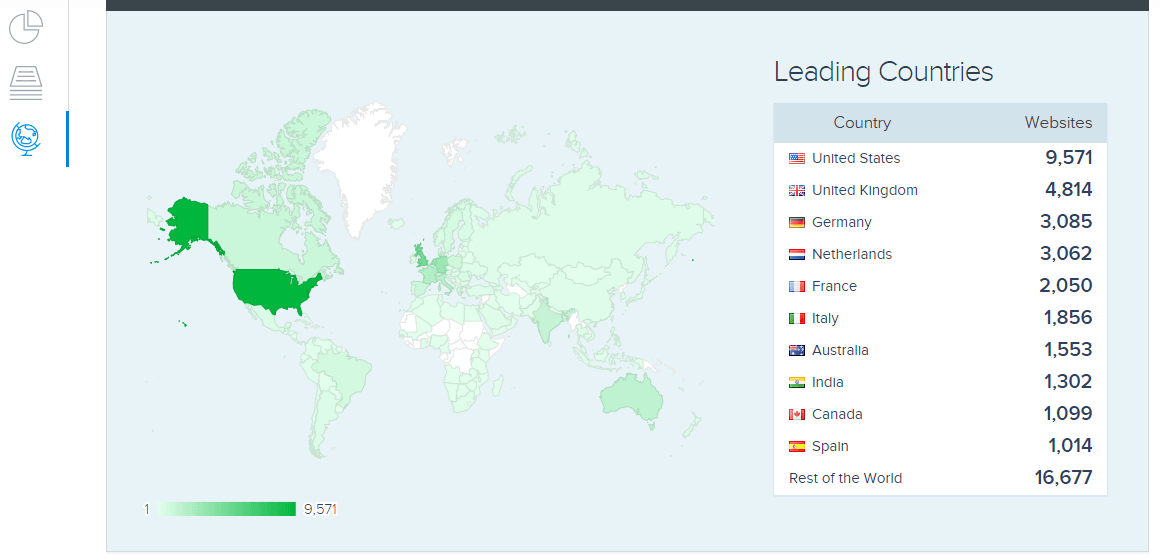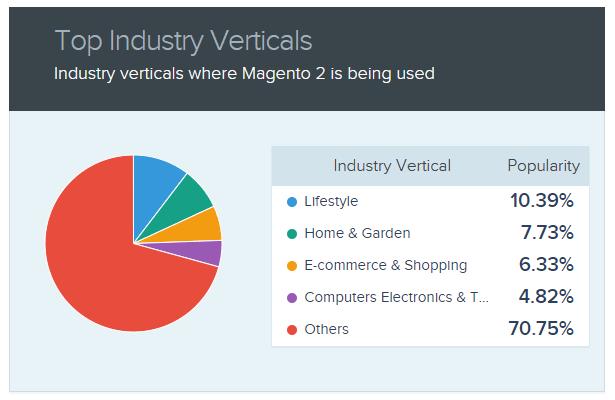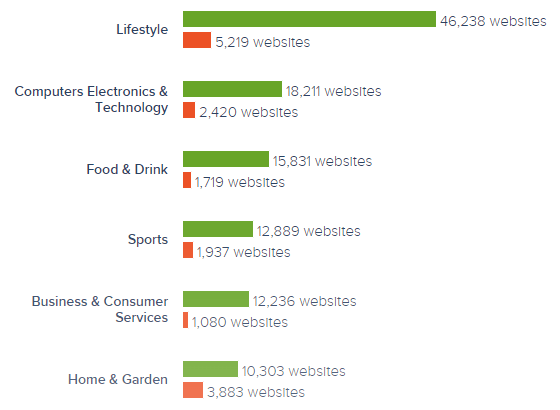With the end of official support for Magento 1 in June 2020, Magento 2 is now the focus. On to Magento 2 statistics.

Starting with facts and figures about the platform, and then talking through some of the biggest pros and cons of the upgrade.
Why Was Magento 2 Launched?

The original platform, first launched in 2007, was stripped down and rebuilt from scratch to create Magento 2.
The reason? Times have certainly changed since 2007, and your eCommerce store needs to reflect this.
Magento 2 is quicker, safer, and easier to use than the original iteration, and the new platform provides a comprehensive set of features that improve administrative options.
December 2024 Offer – For a Limited Time Only:
Get All Access Pass Package for Magento 2 for 25% off! Don’t miss out!
Magento describes the upgrade as empowering ‘brands, retailers, and businesses across B2C and B2B industries to quickly and cost-effectively deliver engaging omnichannel shopping experiences.’
In short, the main goal is to offer a highly personalized customer experience. Its advanced features help brands to deliver high-quality services and an engaging shopping environment.
Another key advancement is that Magento 2 is designed to fit any device, from computer to phone, reflecting the way consumers now shop and increasing your ways to sell.
The platform offers a flexible architecture and promises to increase productivity. It’s easy to use and designed to be touch-friendly, so you can track sales or update products from your smartphone.
The platform makes controlling the functionality, content, and look of your online store easier than ever before.
Magento 2 Around the World

According to SimilarTech, at in 2024 there were 50,255 online stores and 43,221 unique domains built with Magento 2 live on the internet.
The geographic spread of websites is as follows:
- United States – 9,571
- United Kingdom – 4,814
- Germany – 3,085
- Netherlands – 3,062
- France – 2,050
- Italy – 1,856
- Australia – 1,553
- India – 1,302
- Canada – 1,099
- Spain – 1,014
- Other countries – 16,677

Data from SimilarTech
All countries have seen a significant increase in the number of websites built and hosted using Magento 2 over the last couple of years.
The United States’ lead is reflected by stats supplied by BuiltWith. The company found that about 35% of the world’s online stores that use Magento 2 are located in the U.S, head and shoulders above the rest of the world. This is perhaps not surprising when you remember that of the 9.1 million online stores worldwide, 2.5 million are located in the States.
Magento 2 Business Types

When looking at the types of websites (known as industry verticals) using Magento 2, the results are highly interesting.

Data from SimilarTech
Though Magento is most commonly associated with eCommerce, you might be surprised to learn that ‘eCommerce and Shopping’ is not the industry vertical that most websites utilising Magento 2 are used for.
In fact, according to SimilarTech, eCommerce and Shopping accounts for just 6.33% of the overall number. This is led by Lifestyle at 10.39% and on par with Home and Garden at 7.73%. The biggest category by far is what SimilarTech describes as ‘Others’ with a 70.75% share.
While SimilarTech is not transparent about what exactly might constitute this category, this graph, comparing Magento 2 stats with Shopify, gives more of an insight.

Shopify is green; Magento is red. Data from SimilarTech
Here we can see that Lifestyle equates to 5,219 websites; Home and Garden equals 3,883; Sports makes up 1,937 of the total number; 1,719 relate to Food and Drink; and Business & Consumer Services comprises 1,080. Meanwhile, Computers Electronics & Technology equals 2,420.
Magento 2 and Extensions

The number of extensions available for Magento 2 grows year on year. Currently, there are more than 3,300 extensions available on Magento Marketplace. Each extension is designed to improve the experience for both you and your customers.
Here is just a taster of the extensions available for Magento 2:
- Nosto – A must have for your marketing strategy, Nosto has a number of features including personalised e-mail marketing, website pop-ups, and Facebook and Instagram ads.
- InstantSearch+ – Available for free for stores with less than 250 products, InstantSearch+ automatically detects shoppers purchasing intent when searching and matches it with your merchandising priorities.
- Livechat – Adds a ‘live chat’ tool for customer support and online sales, helping you to help your customers make that all important purchase.
- OneStep Checkout – This one helps you to combat the issue of shopping cart abandonment by streamlining your checkout process. This will help to boost your conversion rate in next to no time.
Pros and Cons of Magento 2

If you’re still daunted by the prospect of switching over to Magento 2, it’s important to put things into perspective by looking at the pros and cons.
Let’s start with the bad news:
Cons
- It’s not transferable – unfortunately, it’s not possible to import your Magento 1 themes and extensions directly to Magento 2.
- It can be complex – because of point one, the process can become complicated if you’re going it alone.
- There are costs involved – should you wish to purchase Magento Commerce, there’s quite a high price-tag.
Don’t do it alone! Talk to CreativeMinds about help with Magento 2!
And now for the good points:
Pros
- You own it – even if you hire an outside developer, you, as the business owner, retain the rights to your website code.
- Magento 2 is highly customizable and flexible – you can customize every aspect of your site to suit your business.
- There’s depth of functionality – the number of features Magento allows for is huge, offering truth depth.
- It offers security – one of the main focusses of the shift to Magento 2 was maintaining security for both business owners and customers.
- It’s highly scalable – as your business grows, so can your website.
- There’s extensive opportunity for integration – Magento 2 can be integrated with almost anything, meaning the opportunities are endless.
- It comes with a community – there’s an active community around Magento, meaning there’s always people on hand to help.
An Honest Opinion

We’ve taken just a brief look at the pros and cons of the platform, and everyone’s experience will be different depending on your needs and experience.
There’s no denying that migrating to Magento 2 takes time and patience – we’ve certainly been there and done that. You will inevitably hit walls and find bugs in the system; this is only natural.
However, here at CreativeMinds we continue to champion Magento as one of the best platforms to build and maintain your eCommerce website.
We understand the need for businesses to make this switch to protect themselves and their customers, as well as improve functionality and user experience. And we applaud Magento’s commitment to helping business owners.
Overall, Magento continues to offer business owners a streamlined system with heaps of support and innovative features – so we believe that the pros far outweigh the cons.
If you are migrating your site to Magento 2 and find yourself struggling, CreativeMinds offers support and maintenance. Click here to find out more about what we can do for you.


